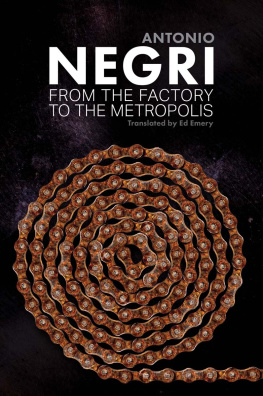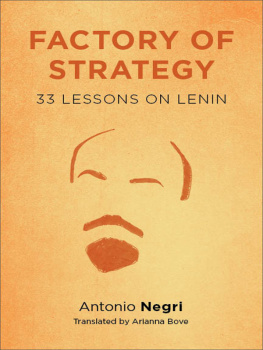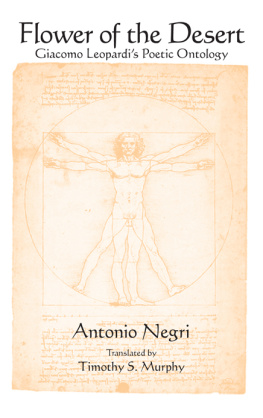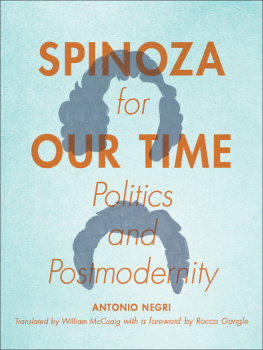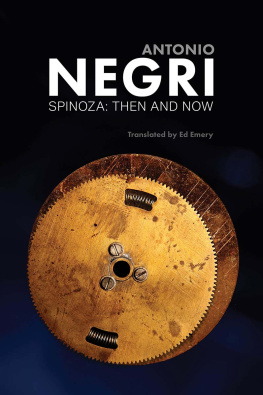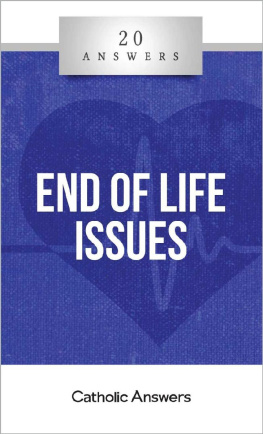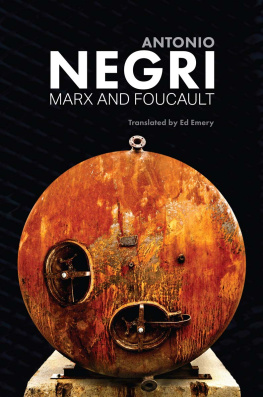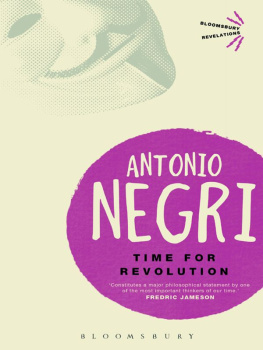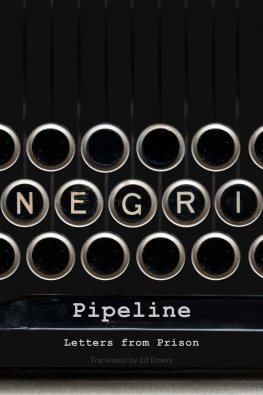Contents
Guide
Pages

From the Factory to the Metropolis
Antonio Negri
Essays Volume 2
Edited by Federico Tomasello
Translated by Ed Emery
polity
Copyright Antonio Negri 2018
The right of Antonio Negri to be identified as the Author of this Work has been asserted in accordance with the UK copyright, Designs and Patents Act 1988.
This English edition Polity Press, 2018
Polity Press
65 Bridge Street
Cambridge CB2 1UR, UK
Polity Press
101 Station Landing
Suite 300
Medford, MA 02155, USA
All rights reserved. Except for the quotation of short passages for the purpose of criticism and review, no part of this publication may be reproduced, stored in a retrieval system or transmitted, in any form or by any means, electronic, mechanical, photocopying, recording or otherwise, without the prior permission of the publisher.
ISBN-13: 978-1-5095-0349-0
A catalogue record for this book is available from the British Library.
The publisher has used its best endeavours to ensure that the URLs for external websites referred to in this book are correct and active at the time of going to press. However, the publisher has no responsibility for the websites and can make no guarantee that a site will remain live or that the content is or will remain appropriate.
Every effort has been made to trace all copyright holders, but if any have been inadvertently overlooked the publisher will be pleased to include any necessary credits in any subsequent reprint or edition.
For further information on Polity, visit our website: politybooks.com
Preface
The thesis that the position of the socialised worker [operaio sociale] in the metropolis parallels that of the mass worker in the factory was crucial during the transition from the first phase (195060) to the second phase (19702000) of Italian workerism [operaismo]; it was entirely central to that extraordinary phase of working-class struggles that inspired workerism. My writings that followed from it, from Empire to Multitude to Commonwealth, each time took this motif as their centrepiece in the analysis of the transformation of the capitalist mode of production, and tested and consolidated the effectiveness of the dispositif right at the heart of globalisation. Recently I have begun to move forward on this terrain (see in particular ). The thing to do was not or no longer to take and compare the two models of factory and metropolis, which had succeeded each other in economic development and in the crisis of the industrial mode of production, but rather to move forward, in a description of the difference between the postindustrial and the postmodern metropolis as a place and space, by now stable, of production and of capitalist exploitation (in postmodernity, to be sure).
All the arguments presented in this book are the outcome of an investigation into the transformations of labour that I developed in parallel with my theoretical and political activity, and they represent a testing of some of those abstract hypotheses. More recently, this analysis and these experimentations have reopened the biopolitical dimensions of the metropolis, completing so to speak the picture of the evolution of forms of the city described in this volume. It is clear that by forms of the city I mean forms of life. With the emergence of the biopolitical dimension, a new analytical point of view also comes into play: that of the common that is, the effort to go beyond the interplay between private and public, which has always constituted the concept of the city and sometimes represents its politicaladministrative aspect. Of course, the concept of the common has always been implicit in that of the city and yet, even when it is not denied or concealed, it is underplayed. The idea of the private and the public had a monopoly on descriptions and programming of the city (and on its consequent corruption, produced by real estate rent), while the common was not accorded the primary role that here, in these essays, I discover and proclaim in the biopolitical. Here my aim is to do away definitively with that hypocrisy.
It follows that the contemporary metropolis can be defined as a space of antagonism between forms of life produced at one end by financial capitalism (the capitalism of rent) and at the other by the cognitive proletariat. To arrive at this analytical result which is a prerequisite for the production of a new subject in struggle it is also necessary for a new image of exploitation to be built. In defining it, I draw inspiration from David Harveys studies on the extraction of surplus value from the city; and I show that this finding is consistent with the work conducted by Italian workerism from the moment in the 1970s when it began to define the new forms of exploitation of the socialised worker. Cognitive proletariat, exploitation through the extraction of surplus value, the common as a condition and purpose of class struggle (meaning the destruction of capitalism): this is the story of my analytical work on the metropolis.
The older texts date from the second half of the 1990s (already twenty years ago how time flies!). But most of the work is concentrated in the first decade of this century. Here I would like to recall to memory the late Jean Marie Vincent and to thank Maurizio Lazzarato, Judith Revel and Federico Tomasello, with whom I have written some of the essays published here and with whom I have always discussed these themes.
Toni Negri
Paris, July 2015
Part I
Exodus from the Factory
The Reappropriation of Public Space
For twenty years things were going on their way at least from the crisis of 19714, when, having digested the struggles of the 1960s and the defeat in Vietnam, multinational capital relaunched its project of development in terms of a postindustrial modernisation and a liberal policy. Those were the years when neoliberalism was imposed. They were grey years, although they were sometimes alleviated, as happened in France, by a number of workers offensives (in 1986 for example) and by a succession of student explosions first expressions of the revolt of immaterial labour around which social protest attempted in vain to organise itself. December 1995 in France marked the first mass break with the political, economic and ideological regime of the liberal period.
Why were the struggles of December 1995 such a breakthrough? Why is it that we see them as the beginning of the end of the counterrevolution of the second half of the twentieth century?
People have begun to give answers to these questions, and these are often interesting. It is eminently obvious that the growing awareness, particularly marked in France, of the intolerable nature of the processes of globalisation and European integration and the feeling of the new presidencys betrayal of republican promises, along with the set of contradictions produced by the new organisation of social labour mobility, flexibility, break-up of the labour market, exclusion and by the crisis of welfare, had immediate effects on the process of formation and radicalisation of the struggle. What seems to me particularly important is the definition of the new context in which the various demands were produced: this was a biopolitical context in the sense that the struggle came up against all the rules of discipline and control of all of the conditions of the reproduction of the proletariat. In short, the struggle took on a universal meaning and became a struggle for the general interest, to the extent of being a refusal of the diktat liberalism or barbarism and of pointing to a new threshold of possibility for the activity of protest and for the expression of a desire for a new world.

